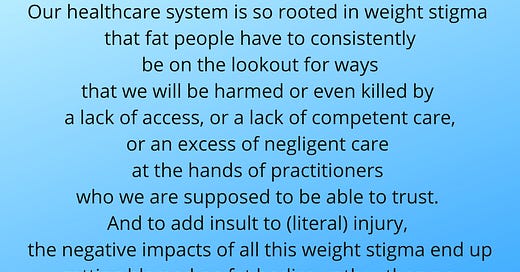How to Explain Weight Stigma in Healthcare
This is the Weight and Healthcare newsletter! If you like what you are reading, please consider subscribing and/or sharing!
Reader Janelle asked “I finally got my boyfriend to admit that fat people deserve healthcare beyond just weight loss, but then he said ‘you already have that.’ How do you explain to people that our healthcare system is rooted in weight stigma – that fat people aren’t getting care like thin people do? While I’m on the subject, what are red flags for you that a practitioner is a fatphobe?”
These are both great questions! I’m going to answer the first question today, and the next question in the next edition of the newsletter.
This is an incredibly important question because if someone can’t see the size-based inequalities in the healthcare system (because they aren’t experiencing them personally and aren’t learning from those who are) then they can’t solve those inequalities. Here are some examples of the ways in which our healthcare system in the US (and in many other parts of the world) is firmly rooted in weight stigma, with a reminder that weight stigma does the most harm to those at the highest weights and those with multiple marginalized identities, and disproportionately impacts people of color, particularly Black folks because it is rooted in racism and anti-Blackness*.
It is absolutely commonplace for facilities, from private practices to huge hospitals, to be created without rooms, furniture, or medical devices that accommodate fat people. Some examples include not having wide enough chairs in the lobby, a properly sized blood pressure cuff, an accommodating MRI machine, or a high weight capacity surgical table, hospital bed, and more. This is despite the fact that these items exist (and, in many cases, existed when the facility was built) and that those in charge of building, furnishing, and supply purchasing knew that fat people existed. Often the answer we get is basically that the facility doesn’t think giving fat people equitable treatment is worth the money it would cost (the fact that so many practitioners and administrative staff are so willing to say that is another layer of proof of the level of fatphobia.) Medical weight stigma is building a “community health center” that doesn’t accommodate fat members of the community.
Fat people often find their actual health issues and symptoms ignored or brushed aside by healthcare practitioners who are so myopically focused on manipulating fat patient’s body size that they fail to give them the same evidence-based, ethical care (including everything from diagnostic tests to treatment protocols) that thin people with the same symptoms would get. Instead they prescribe diets which not only have almost no chance of leading to long-term significant weight loss, but can delay the start of treatment that could actually be helpful. Medical weight stigma is being prescribed a diet when a thin person would get an actual healthcare intervention for the same symptoms.
Fat patients who need surgeries, everything from joint replacement, to transplants, to gender affirming procedures, often have the surgeries refused on the grounds that they are “too dangerous” due to their size. Then those same patients find themselves are referred to weight loss surgery…by a doctor who just denied them a surgery. So instead of a surgery to promote healing, they get offered weight loss surgery, which actually takes their healthy digestive system and puts it into a disease state. It poses significant risks for horrific lifelong complications and death. Typically far more risks (with far less data about long-term outcomes) than the surgery the fat patient actually needs/wants. Medical weight stigma is being denied surgery…unless it’s a surgery to make you thin.
Our healthcare system has a long and sordid history of approving and prescribing drugs because they demonstrate short-term weight loss that are eventually taken off the market because they harm and even kill fat patients. Medical weight stigma is a healthcare system that thinks it’s worth risking fat people’s lives and quality of life to make them a little bit thinner (at least temporarily) based on short-term studies with little to no data about long-term outcome.
The bottom line is that our healthcare system is so rooted in weight stigma that fat people have to consistently (and completely rationally) be on the lookout for ways that we will be harmed or even killed by a lack of access, or by a lack of competent care and/or an excess of negligent care at the hands of practitioners who we are supposed to be able to trust. And to add insult to (literal) injury, the negative impacts of all this weight stigma end up getting blamed on fat bodies, rather than on the weight stigma that fat people experience.
We need a healthcare system that acknowledges the natural diversity of body sizes and provides weight-neutral care to support the health of people of all sizes.
Did you find this post helpful? You can subscribe for free to get future posts delivered direct to your inbox, or choose a paid subscription to support the newsletter (and the work that goes into it!) and get special benefits! Click the Subscribe button below for details:
More research and resources:
https://haeshealthsheets.com/resources/
*Note on language: I use “fat” as a neutral descriptor as used by the fat activist community, I use “ob*se” and “overw*ight” to acknowledge that these are terms that were created to medicalize and pathologize fat bodies, with roots in racism and specifically anti-Blackness. Please read Sabrina Strings’ Fearing the Black Body – the Racial Origins of Fat Phobia and Da’Shaun Harrison’s Belly of the Beast: The Politics of Anti-Fatness as Anti-Blackness for more on this.



